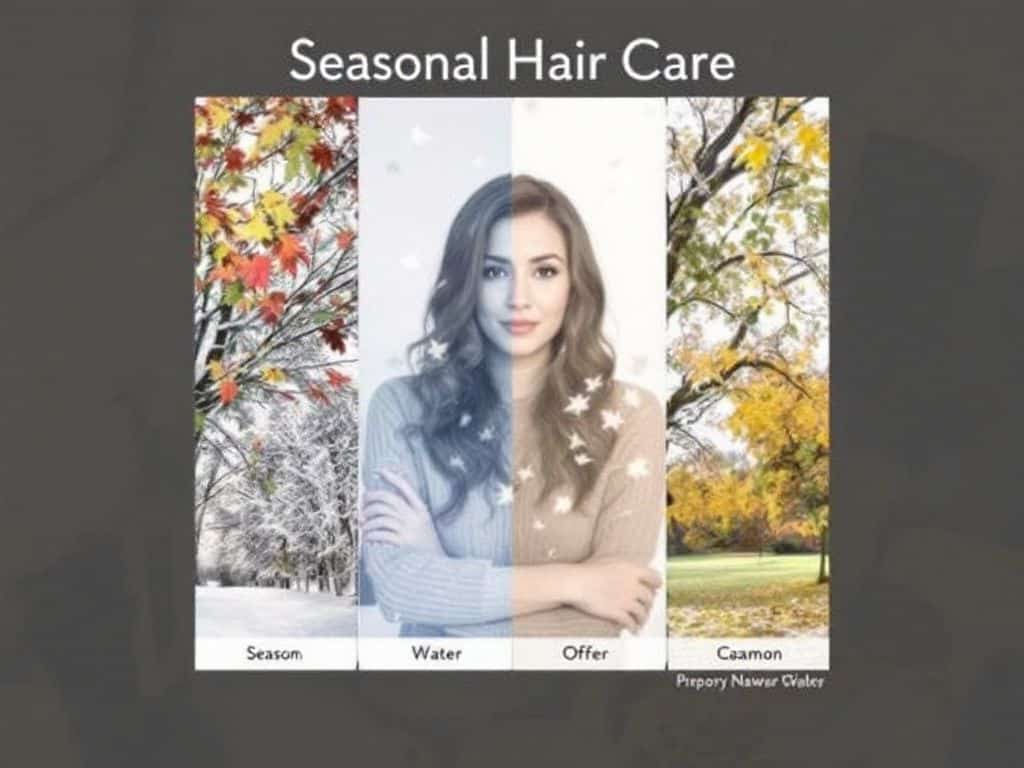
As we transition through the different seasons, one can’t help but notice the changing needs of our scalp and hair. These changes are driven by variations in humidity, temperature, and environmental factors which can significantly affect hair’s health and appearance. Let’s delve into the science behind seasonal hair care and explore evidence-based solutions to common hair concerns that arise during different times of the year.
**Spring and Scalp Rejuvenation**
In spring, the dry, cold air of winter gives way to more humidity, which can increase oil production on the scalp, leading to potential issues such as dandruff or greasiness. A study published in the *International Journal of Trichology* highlighted the efficacy of salicylic acid in scalp treatments for managing oily scalps and dandruff. Products containing 2% salicylic acid, such as Neutrogena T/Sal Therapeutic Shampoo, can help exfoliate the scalp, preventing the buildup of dead cells and excess oil. For more on managing oily scalp, see best shampoos for oily scalps and oily hair solutions products you’ll actually love.
**Summer Sun Protection**

During the summer months, UV exposure becomes a significant factor, as it can cause hair protein loss and color fading. Using leave-in conditioners with UV filters is crucial. Ingredients like benzophenone provide a protective barrier against UV damage, an effect substantiated by a study in the *Journal of Photochemistry and Photobiology B: Biology*. The Rene Furterer Solaire Protective Summer Oil is recommended for its inclusion of these specific UV-protectant ingredients, coupled with nourishing oils that prevent dehydration. To keep your hair safe from heat damage, consider the best heat protectant for hair.
**Autumnal Adjustments**
Autumn often introduces cooler air and lower humidity levels, which may lead to dryness and increased hair shedding. According to research, incorporating protein-rich conditioners can fortify hair against physical and environmental stressors. Hydrolyzed keratin, a staple in damaged hair treatments, aids in rebuilding strength. Products like the OGX Anti-Breakage Keratin Oil Shampoo show a robust solution to seasonal shedding and dryness, capitalizing on the reparative benefits of keratin. For more on this, see our detailed protein treatment hair care guide.

**Winter and Hydration**
The frigid temperatures of winter exacerbate dryness due to indoor heating and cold winds. Effective winter hair care must focus on moisture retention. Glycerin and hyaluronic acid are proven humectants recommended for deep hydration. The *Journal of Cosmetic Dermatology* recognizes their ability to draw moisture to the hair shaft when applied in conditioners and masks. L’Oréal Paris Elvive Hyaluron Plump Conditioner combines hyaluronic acid and other moisturizing agents to combat winter dryness effectively. For additional hydration tips, explore our hair oils for dry scalp and best oils for scalp health.
**Additional Strategies for All Seasons**
Regardless of the season, integrating a well-balanced diet rich in essential fatty acids, vitamins, and minerals is foundational for healthy hair. Omega-3 fatty acids, in particular, have been demonstrated to maintain scalp health and improve hair density, as shown in studies within *The Journal of Dermatological Treatment*. Moreover, scalp massages can enhance blood circulation and promote healthy hair follicles. Implementing a consistent routine with a gentle scalp massager for hair growth or a scalp hair brush for hair growth can efficiently distribute natural oils while stimulating growth.
By strategically choosing products and adopting scientifically-backed practices tailored to each season’s unique challenges, individuals can maintain optimal hair and scalp health year-round. Always opt for evidence-driven solutions and personalized care routines to ensure both sustainability and effectiveness in your hair care regimen.
Frequently Asked Questions
How does seasonal change affect curly hair?
Seasonal changes significantly impact curly hair due to variations in humidity, temperature, and moisture levels. For example, high humidity in summer can lead to excessive frizz and dryness, while the dry air in winter can strip moisture from the hair, making it dry and brittle. For understanding how hair porosity changes over time with seasons, see hair porosity changes over time.
What are the key tips for curly hair care in the summer?
In the summer, it is crucial to use products with UV protection to shield curls from sun damage. Applying a rich hair mask once a week, using a hydrating mist, and avoiding excessive heat styling can help maintain moisture and manage frizz. Additionally, consider co-washing and using anti-frizz curly hair products to combat humidity.
How should I adjust my curly hair care routine for the winter season?
During winter, focus on hydrating your curls by deep conditioning once or twice a week and using a rich, emollient conditioner. Increase the use of moisturizing products like curl creams and hair oils, and avoid protein treatments that can dry out your hair. Also, protect your hair from cold air by covering it with a silk scarf or hat when going outside. For stylish options, see scarves for hair loss stylish solutions. For hair aging management tips, visit hair aging management tips.
What are some general tips for maintaining curly hair across different seasons?
Regardless of the season, it’s important to tailor your curly hair routine to the specific challenges of each time of year. Use lighter styling products in mild weather, switch to more moisturizing products in dry seasons, and consider using a humidifier indoors during dry months. Regular deep conditioning and the use of natural ingredients like argan oil and shea butter can also help keep your curls healthy and defined. For more on embracing natural textures, see embracing natural waves 3a hair care.


Leave a Reply